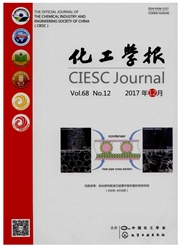

 中文摘要:
中文摘要:
采用分子动力学模拟方法 Green-Kubo理论计算了263.15 K、3 MPa,sⅠ乙烷水合物、乙烯水合物的导热,给出密度和热导率值。从主客体分子和晶体结构(致密性、规整程度)对导热的影响等角度研究了烃类水合物(甲烷水合物、乙烷水合物、乙烯水合物)导热的特性。结果显示化学性质相似、分子量相差不大的烃类形成的水合物,其导热具有相似的温度压力依赖关系和晶体结构相关关系。对于sⅠ型水合物,水分子对水合物导热的影响远远超过客体分子对导热的影响。水合物的分子量越大,水合物密度越大,热导率越大。水合物晶体越致密、晶格越规整,热导率越大。
 英文摘要:
英文摘要:
Equilibrium molecular dynamics simulations and the Green-Kubo method are used to the s I hydrates of methane, ethane and ethene to study their thermal conduction at temperature 263.15 K and pressure 3 MPa. Thermal conductivities and mean densities of the hydrates are obtained. Characteristics of thermal conduction in hydrates of hydrocarbon such as methane, ethane or ethene are studied for the effects of host and guest molecules and compactness and regularity of the crystal lattice on thermal conduction. The results show that thermal conduction is similar for the hydrocarbon hydrates that resembles chemically with indistinct difference in molecular weight. The thermal conduction of these hydrocarbon hydrates has similar temperature and pressure dependence and similar crystal structure correlation. The influence of water on thermal conductivity of s I gas hydrates goes far beyond the effect of guest molecules on it. With higher mean molecular weight in hydrates, higher densities are more conducive to enhance the thermal conductivity. More compact crystal lattices improve thermal conductivities. With more regular lattice structures, phonon mean free paths are longer, so that the thermal conductivity of hydrate increases.
 同期刊论文项目
同期刊论文项目
 同项目期刊论文
同项目期刊论文
 Gas Hydrate System of Shenhu Area, Northern South China Sea:Wire-line Logging, Geochemical Results a
Gas Hydrate System of Shenhu Area, Northern South China Sea:Wire-line Logging, Geochemical Results a Phase Equilibria and Dissociation Enthalpies of Hydrogen Semi-Clathrate Hydrate with Tetrabutyl Ammo
Phase Equilibria and Dissociation Enthalpies of Hydrogen Semi-Clathrate Hydrate with Tetrabutyl Ammo A Method to Use Solar Energy for the Production of Gas from Marine Hydrate-Bearing Sediments: A Case
A Method to Use Solar Energy for the Production of Gas from Marine Hydrate-Bearing Sediments: A Case Phase equilibrium conditions of tetrabutyl ammonium nitrate + CO 2, N2, or CH4 semiclathrate hydrate
Phase equilibrium conditions of tetrabutyl ammonium nitrate + CO 2, N2, or CH4 semiclathrate hydrate Molecular and stable carbon isotopic compositions of saturated fatty acids within one sedimentary pr
Molecular and stable carbon isotopic compositions of saturated fatty acids within one sedimentary pr Numerical investigation on methane hydrate accumulation in Shenhu Area, northern continental slope o
Numerical investigation on methane hydrate accumulation in Shenhu Area, northern continental slope o Contamination and distribution of heavy metals in urban and suburban soils in Zhangzhou City, Fujian
Contamination and distribution of heavy metals in urban and suburban soils in Zhangzhou City, Fujian Numerical Analysis on Gas Production Efficiency from Hydrate Deposits by Thermal Stimulation: Applic
Numerical Analysis on Gas Production Efficiency from Hydrate Deposits by Thermal Stimulation: Applic Characteristics of authigenic pyrites in shallow core sediments in the Shenhu area of the northern S
Characteristics of authigenic pyrites in shallow core sediments in the Shenhu area of the northern S Early Diagenesis Records and PoreWater Composition of Methane-Seep Sediments from the Southeast Hain
Early Diagenesis Records and PoreWater Composition of Methane-Seep Sediments from the Southeast Hain Static Formation and Dissociation of Methane+Methylcyclohexane Hydrate for Gas Hydrate Production an
Static Formation and Dissociation of Methane+Methylcyclohexane Hydrate for Gas Hydrate Production an Invasion of drilling mud into gas-hydrate-bearing sediments. Part I:effect of drilling mud propertie
Invasion of drilling mud into gas-hydrate-bearing sediments. Part I:effect of drilling mud propertie Invasion of drilling mud into gas-hydrate-bearing sediments. Part Ⅱ:Effects of geophysical propertie
Invasion of drilling mud into gas-hydrate-bearing sediments. Part Ⅱ:Effects of geophysical propertie 期刊信息
期刊信息
